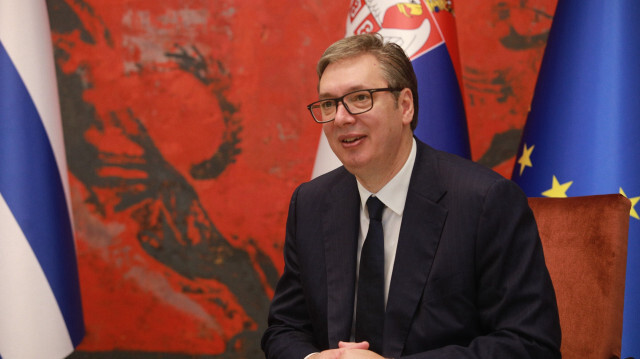
Albin Kurti wants to raise tension and become a war leader, says Serbian President Vucic
The Serbian president Saturday said Kosovo's prime minister wants to drag Serbia into war with NATO.
"(Albin) Kurti will not stop. The bottom line is that he does not want to establish the Community of Serb Municipalities. He knows that this community must be in accordance with the principles from 2015 that (former Prime Minister of Kosovo) Isa Mustafa and I initialed. They will not allow the Serbs to do that.
"He wants to raise tension, he wants to drag us into the war. He wants to be a war leader, because he lacks that in his biography," Aleksandar Vucic told the local broadcaster Pink TV.
According to Vucic, Kurti's ambition is to draw Serbia into a conflict with NATO and it is clear to the key actors that the main fault lies with Kurti's regime.
"Serbia now has to be careful," he also noted.
Vucic will meet again Saturday with representatives of Serbs from Kosovo and Metohija region.
He said the strength of the Serbian army is incomparably greater than the Kosovo Security Forces, but that they are increasingly better armed, primarily with Turkish weapons.
"The Turks gave them very powerful armored vehicles, mortars, Bayraktars, howitzers, these are all things that Kosovo Security Forces has. We have to take that into account.
"NATO has not yet allowed them to fly Bayraktars, but they have visibility at night for tens of kilometers. We have to be careful. We know what we are doing. We have to have adequate means to react if our people are threatened. These are not stories and fairy tales, the world has changed," Vucic added.
The Kosovo Security Forces received five of Türkiye's Bayraktar TB2 drones in early May amid the start of the largest international exercise, Defender Europe 23.
The Turkish combat drones are considered pivotal in conflicts ranging from Karabakh to Ukraine.
Albania and Serbia reaffirmed their intentions to purchase combat drones which have been in high demand worldwide.
"Within five months, we (Serbia) will receive several hundred to 1,000 kamikaze drones, which we took in the Middle East. We are taking that to deter a potential aggressor," said Vucic.
After Albanians, Serbs are Kosovo’s biggest ethnic group, especially in the country’s north, next to Serbia. Serbia has never recognized the 2008 independence of Kosovo.
The election of ethnic Albanian mayors this April amid a Serb boycott led to tension in the north. Troops from neighboring Serbia also amassed at the border.
- New elections needed: EU
The European Union urged Kosovo repeatedly to suspend police operations in the northern Serb-dominated municipalities and announce new snap local elections.
After the April elections in northern Kosovo, the EU said the low turnout among local Serbs did not provide municipalities with long-term political solutions.
Ethnic Serbs have been protesting the election of the mayors since late May.
On May 30, NATO decided to deploy 700 more troops to KFOR, the alliance-led peacekeeping mission in Kosovo, after 30 of its soldiers were injured amid unrest. A contingent of Turkish troops was among the reinforcements.
- Tensions on border
Tensions were sparked following Kosovo’s detention of one of the organizers of a May 29 attack on NATO's peacekeeping force, which was deployed amid Serb unrest over the installation of the ethnic Albanian mayors.
Serbia detained three Kosovo police officers on June 14, saying they were "planning an action in Serbia," but Kosovo claimed that its officers had been kidnapped.
The EU requires Kosovo and Serbia to reach a final agreement and resolve their disputes to move forward with their integration into the bloc.
Most UN member states – including the US, UK, France, Germany, and Türkiye – recognized Kosovo as a country separate from its neighbor when Pristina declared its independence 15 years ago, but Belgrade continues to regard it as its territory.

